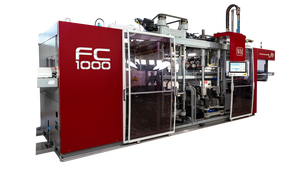Here's why: You can check out any time you like, but your equipment (and IP) can never leave.
June 22, 2017

 Although she wasn’t aware of it at the time, Rosemary Coates, who is currently Executive Director of the Reshoring Institute (Los Gatos, CA), was working for the dark side. Coates spent the 1980s and 1990s helping U.S. manufacturers offshore operations, first mostly to Singapore, Malaysia and Taiwan, and then increasingly to China after it joined the World Trade Organization in 2001. It seemed like the right thing to do from a business perspective. She began to have second thoughts, though, during the 2012 presidential campaign, when President Obama and Republican candidate Mitt Romney alike had harsh words to say about U.S. companies sending jobs to China. Her real epiphany came later, when she thought about the future her grandchildren might face if this trend were to continue unchecked. “All of these companies moved their operations to China, and I helped them do it, I thought to myself,” Coates told PLASTEC East/MD&M East attendees from Center Stage last week. So, in 2014, Coates founded the Reshoring Institute, dedicated to providing research and support for companies bringing manufacturing back to the United States.
Although she wasn’t aware of it at the time, Rosemary Coates, who is currently Executive Director of the Reshoring Institute (Los Gatos, CA), was working for the dark side. Coates spent the 1980s and 1990s helping U.S. manufacturers offshore operations, first mostly to Singapore, Malaysia and Taiwan, and then increasingly to China after it joined the World Trade Organization in 2001. It seemed like the right thing to do from a business perspective. She began to have second thoughts, though, during the 2012 presidential campaign, when President Obama and Republican candidate Mitt Romney alike had harsh words to say about U.S. companies sending jobs to China. Her real epiphany came later, when she thought about the future her grandchildren might face if this trend were to continue unchecked. “All of these companies moved their operations to China, and I helped them do it, I thought to myself,” Coates told PLASTEC East/MD&M East attendees from Center Stage last week. So, in 2014, Coates founded the Reshoring Institute, dedicated to providing research and support for companies bringing manufacturing back to the United States.
Coates still consults with many clients that are manufacturing in China, but these tend to be companies producing goods that are sold in the domestic markets in which they are operating. “We call it local for local,” Coates told PlasticsToday. And that principle should apply to the North American market, as well.
“The United States lost about 2.7 million manufacturing jobs between 2001 and 2011, and that really got to me,” said Coates. Rising labor costs in China have chipped awat at that flow, but only up to a point. Yes, wages have been going up 14 to 18% per year, but, noted Coates, “for roughly the same job, a Chinese worker currently earns $4.63 per hour where a U.S. worker makes $26.10. It will be a long time before Chinese wages catch up.”
Bringing back manufacturing jobs to the United States is all well and good, but they have to be the right jobs or we're just spinning our wheels. Rosemary Coates spoke with PlasticsToday in April about the types of jobs we need to truly make America great again: "Yes, manufacturing jobs are coming back, but they are fewer than advertised . . . and better." |
More importantly, perhaps, for the reshoring movement, the mood in our country has changed, and the notion of corporate economic patriotism has lost its French inflection. (France more or less invented the concept several years ago, as a justification for dissuading businesses from moving manufacturing to other low-wage countries and attempting to obstruct some mergers with non-French companies.) The example of Walmart, which has pledged to spend more than $250 billion over 10 years to buy goods made in the United States, is a shining example. “Remember when Walmart moved procurement to Shenzhen, China, and factories were closing across the United States and people lost jobs? Those people were Walmart customers, and the corporation had its ‘a-ha’ moment and shifted its strategy. The result [of this and other initiatives] has been a revitalization of industry, especially plastics,” said Coates.
Rising labor and transportation costs are causing some manufacturers to reconsider setting up operations in China, but quality, IP and cultural issues, arguably, are more compelling. Coates showed PLASTEC East attendees a picture she took of a machine shop she visited in Beijing to make her point. “There was metal flying around, yet none of the workers wore eye or toe protection, and you could barely see any yellow lines on the floor, indicating where you could walk safely,” she said. “There are few regulations in China, and the ones that exist are rarely enforced. That is one of the reasons why it’s so cheap to manufacture over there,” said Coates.
And then there are business practices that, from a U.S. perspective, might send a chill down your spine. For manufacturers, China can be a bit like the “Hotel California”: You can check out any time you like, but your equipment (and IP) can never leave. “If you have shipped a mold or die to China, don’t plan on getting it back,” Coates told PlasticsToday during an interview prior to the event. “Once its there it’s considered to be part of their infrastructure. They feel they own it. If you have proprietary molds or designs built into your tool, advance with your eyes open.”
“And just because your business is leaving the country, it’s not as if your contract molders will forget how to make your product,” said Coates during her Center Stage presentation. “They will just put another label on it and sell it in third world countries.” Some are brazen enough to sell it in your own backyard. PlasticsToday has reported in the past on Chinese manufacturers exhibiting counterfeit products at U.S. trade shows. Unfortunately for them, the legitimate manufacturer of the product was also at the show, and he alerted authorities.
And then there's the cautionary tale of Chip Starnes, a U.S entrepreneur who set up a business in China providing contract molding, among other services, to medical device companies. In 2013, he decided to move operations to India. When his employees got wind of that, they kidnapped him and held him hostage for six days until they received assurances that their employment contracts would be honored. He was well treated by his captors, but still . . . .
For these and other reasons, it’s vitally important to look at the total cost of ownership when you’re thinking about outsourcing operations. And that includes considering the cost of checking out when what looked like a sweet business opportunity turns sour.
About the Author(s)
You May Also Like




